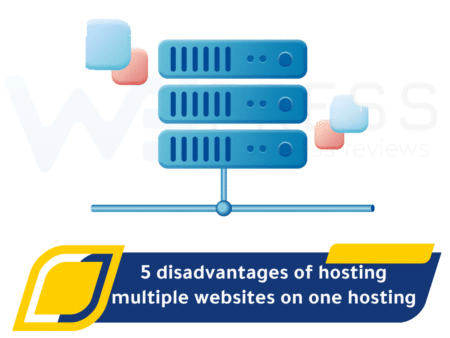Web hosting is a service that allows companies and individuals to rent space to publish a website or web page on the internet. Web hosting service providers are companies that provide space on a web server they own or lease for use by their clients. With more than 5 million websites on the web, hosting companies make reasonable profits.
Disadvantages of Hosting Multiple Sites on One Hosting Server
It’s common for developers to use one hosting service for several websites on a single hosting server. However, users may face issues when their hosting server includes multiple websites. If the server cannot accommodate more sites, the number of plugins and themes in the hosting can lead to resource shortages. Additionally, increased traffic to one site might disrupt the other sites, causing them to slow down or crash. Here are some of these risks:
Performance Issues
- When multiple websites share the same hosting server, one site can cause disruptions for the others. All sites share the same server resources such as RAM, storage, and CPU. If one site uses up the hosting resources, it can slow down or disable other sites. The more sites there are, the more resources are distributed, reducing the share for each site. Visitors might avoid a site due to poor resource allocation leading to slow loading times.
- Performance problems occur when one website on the hosting server uses a large amount of resources. This can be due to high traffic and the use of media like images and videos or having many themes and plugins on one site.

Security Issues
- If one of the sites is weak in terms of security, it can open the door to malicious attempts targeting all other sites on the hosting. Although hosting providers claim that other sites are secure, hacking one site can put all other sites on the same server at risk. They might end up on blocklists or have their content manipulated, necessitating strong security measures and continuous monitoring. These security problems can require significant intervention to fix, potentially costing more than hosting each site separately. Risks include outdated plugins or themes that may lack necessary security updates.
- Hosting multiple sites on the same server increases the risk of exploiting security vulnerabilities in one site to affect the others. For example, if a security hole is found in a blog, it might allow access to databases of other sites, including commercial sites handling sensitive data. This can lead to significant security risks and potential legal liabilities if a client files a lawsuit over a data protection breach.
Negative Impact on SEO
- Hosting multiple sites on one server can negatively affect SEO. One negative effect is the dispersion of electronic addresses, which can dilute the digital identity of a site and its link strength. When electronic addresses are dispersed, it becomes harder for search engines to understand the site and rank it correctly, negatively impacting its performance and visibility in search results.
- Blocked Sites
- If a site on a shared hosting server is blocked by search engines, the associated IP address of the hosting server may be blocked, affecting all other sites on the same server. This shared IP can lead to indirect consequences for other sites on the same server. Access to data might not be as secure as on virtual private servers (VPS).
- Electronic Address Dispersion
- The dispersion of electronic addresses is a negative impact resulting from hosting multiple sites on one server for SEO. Having several sites under the same hosting can spread the addresses among these sites, making them less focused and distinguished in the eyes of search engines. This can reduce the effectiveness of keywords and titles in displaying the site in search results, lowering chances of attracting visitors and achieving the desired interactions.
Backup and Site Restoration
- Hosting providers periodically back up sites. In case of a disaster or data loss, these backups are crucial for restoring sites to their previous state. However, managing backups for multiple sites on the same server can be challenging, and backup files may sometimes overlap, making it difficult to restore one of the sites. The increased number of required backups demands additional storage space and more complex management.
Maintenance Complexity
- Technical support complexity increases with more sites on the same hosting. Solving issues and providing support for a variety of sites requires comprehensive knowledge of each site and its components, increasing the workload on the support team.
Conclusion
Although hosting multiple sites on one server may seem attractive in terms of cost savings and initial simplicity, it comes with significant challenges and difficulties related to security, speed, SEO, maintenance, and management. You can ask wepress about best webhosting via support team : click here.







